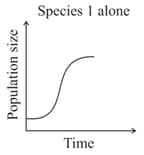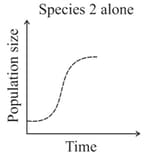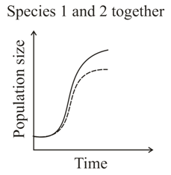Population Interaction
Population Interaction: Overview
This topic covers concepts such as Gause's Principle, Population Interactions, Positive Interactions, Commensalism, Mutualism, Negative Interactions, Parasitism, Predation, Competition among Species, Amensalism, Cryptic Coloration, etc.
Important Questions on Population Interaction
The egrets always forage close to where the cattle are grazing. The interaction between them can be called:
Which of the following interactions play a key role in keeping an eye on the number of the population?
Find the correct match of the organisms with the interaction they exhibit:
(a) Cuscuta growing on a shoe flower plant i)Brood Parasitism
(b) Mycorrhizae living on the roots higher plants. ii)Commensalism
(c) Clownfish living among the tentacles of a sea anemone. iii)Mutualism
(d) Koel laying her eggs in the crow’s nest. iv)Parasitism
Territoriality occurs as a result of
The symbiotic relationship of algae and fungus is found in
Which among the following is a type of defensive adaptation in plants?
Cattle do not feed on the Calotropis plant. Why?
Give an example of morphological adaptations for defence in the plants.
The cardiac glycosides are produced by which of the following plant?
The function of aposematic colouration is to
Which of the following is not a parasitic adaptation in parasitic oragnisms?
The population interaction that exists between Cuckoo and crow is parasitism as Cuckoo lays eggs in crow's nest.
Cuckoo laying eggs in crow’s nest is an example of mutualism.
Wasp laying eggs in the fig fruit represents which population interaction?
Name the population interaction that exists between Sea-anemone and clown fish.
Given the graphs below, the interaction between species and can be classified as



Wasp laying eggs in fig flower is an example of
Sea-anemone and clownfish exhibit commensalism.
